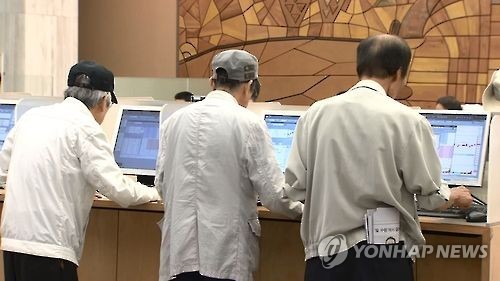South Korea’s stock investors are aging as the younger generation, partly from lack of extra money and disappointing profit rates, shuns active participation, data indicated Monday.
According to securities information portal SEIBro operated by the Korea Securities Depository, the age of the main investors in the country’s top 10 market cap companies has been increasing over the past 10 years.
 |
(Yonhap) |
For Samsung Electronics, 2.77 percent of the investors were in their 20s as of the end of last year compared to 5.41 percent 10 years ago. In other comparisons, investors in their 30s fell from 25.68 percent at the end of 2006 to 10.79 percent at the close of 2016.
Similarly, those in their 30s fell from 25.68 percent to 10.79 percent and 40-somethings from 27.72 percent to 24.93 percent.
The number of investors in their 50s, contrarily, increased from 19.83 percent to 23.51 percent. For those in their 60s, the number increased from 10.63 percent to 15.6 percent, and 70-somethings from 3.65 percent to 8.06 percent. Stock owners in their 80s also rose from 1.01 percent to 2.4 percent.
Naver, the country’s largest portal, lost investors in their 30s whose ratio fell from 28.49 percent to 18.08 percent. People in their 20s also dropped from 9.14 percent to 3.77 percent. But investors in their 60s increased from 9.7 percent to 12.45 percent and those in their 70s from 3.12 percent to 5.88 percent.
The situation was repeated in conglomerates outside of the top
10 market caps. Looking specifically at investors in their 30s, their proportion at Hyundai Mobis fell from 16.32 percent to 8.83 percent.
For LG Display, the 30s group was halved from 32.21 percent to 16.22 percent, while the 60s group increased from 8.03 percent to 16.03 percent.
Watchers say only the elderly, who had the experience of successful stock investment during the previous boom, are staying in the market, while the younger members of society are struggling with unemployment and debts.
“With the benchmark Kospi so boxed in, the younger generation does not have much experience in making money from stocks,” Hwang Sei-woon, head of capital markets at the Korea Capital Market Institute, said in his analysis. “The income of the younger generation isn’t high, but even if it is high, stocks are probably not that attractive.” (Yonhap)








![[Today’s K-pop] Blackpink’s Jennie, Lisa invited to Coachella as solo acts](http://res.heraldm.com/phpwas/restmb_idxmake.php?idx=644&simg=/content/image/2024/11/21/20241121050099_0.jpg)